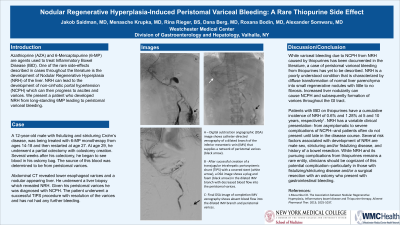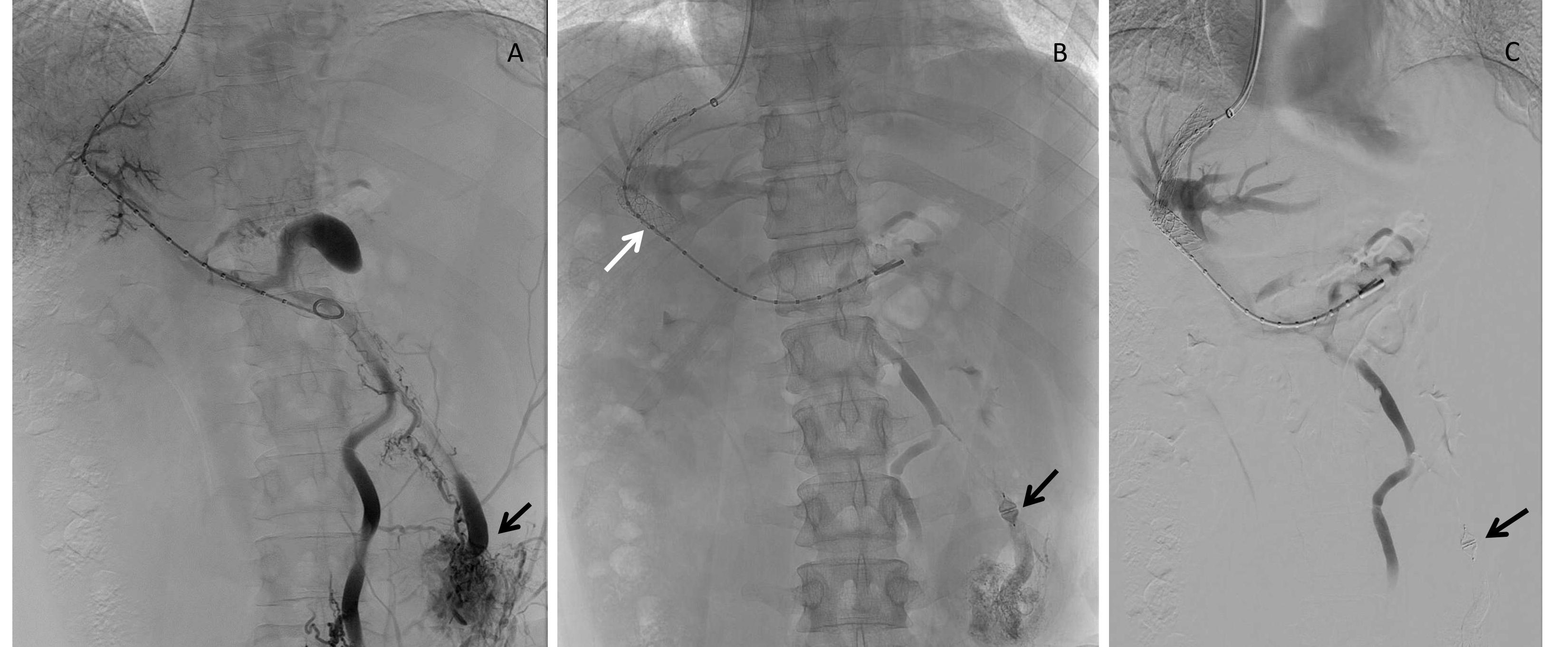Back


Poster Session C - Monday Afternoon
Category: IBD
C0440 - Nodular Regenerative Hyperplasia-Induced Peristomal Variceal Bleeding: A Rare Thiopurine Side Effect
Monday, October 24, 2022
3:00 PM – 5:00 PM ET
Location: Crown Ballroom

Has Audio
- JS
Jakob Saidman, MD, MS
Westchester Medical Center
Valhalla, NY
Presenting Author(s)
Jakob Saidman, MD, MS1, Menasche Krupka, MD1, Rina M. Rieger, BS2, Dana Berg, MD1, Roxana Bodin, MD1, Alexander S. Somwaru, MD3
1Westchester Medical Center, Valhalla, NY; 2Westchester Medical Center, Staten Island, NY; 3Westchester Medical Center, Valhalla, NY
Introduction: Azathioprine (AZA) and 6-Mercaptopurine (6-MP) are agents used to treat Inflammatory Bowel Disease (IBD). One of the rare side-effects described in cases throughout the literature is the development of Nodular Regenerative Hyperplasia (NRH) of the liver. NRH can lead to the development of non-cirrhotic portal hypertension (NCPH) which can then progress to ascites and varices. We present a patient who developed NRH from long-standing 6MP leading to peristomal variceal bleeding.
Case Description/Methods: This case involves a 12 y/o male with fistulizing and stricturing Crohn’s disease, who was on 6-MP monotherapy from ages 14-18 and then restarted at age 27. At age 29, he underwent a partial colectomy with colostomy creation. Subsequently, he began to experience blood in his ostomy bag, which was later identified to be due to peristomal varices. Abdominal CT revealed lower esophageal varices and a nodular appearing liver. Liver biopsy then confirmed NRH, which had progressed to NCPH, and ultimately bleeding peristomal varices. The patient underwent a successful TIPS procedure with resolution of the varices and has not had any further bleeding.
Discussion: While there are a few cases of esophageal and gastric variceal bleeding due to NCPH secondary to thiopurine induced NRH, a case of peristomal variceal bleeding has yet to be described. NRH is a poorly understood condition that is characterized by diffuse transformation of normal liver parenchyma into small regenerative nodules with little to no fibrosis. Increased liver nodularity can cause NCPH and subsequently formation of varices throughout the GI tract. Patients with IBD on thiopurines have a cumulative incidence of NRH of 0.6% and 1.28% at 5 and 10 years, respectively1. NRH has a variable clinical presentation- from asymptomatic to severe complications of NCPH--and patients often do not present until late in the disease course. Several risk factors associated with development of NRH are male sex, stricturing and/or fistulizing disease, and history of a bowel resection. While NRH and its pursuing complications from thiopurines remains a rare entity, clinicians should be cognizant of this potential complication--particularly in those with fistulizing/stricturing disease and/or a surgical resection with an ostomy who present with gastrointestinal bleeding.
1.Musumba CO. The Association between Nodular Regenerative Hyperplasia, Inflammatory bowel disease and Thiopurine therapy. Aliment Pharmacol Ther. 2013; 1025-1037.

Disclosures:
Jakob Saidman, MD, MS1, Menasche Krupka, MD1, Rina M. Rieger, BS2, Dana Berg, MD1, Roxana Bodin, MD1, Alexander S. Somwaru, MD3. C0440 - Nodular Regenerative Hyperplasia-Induced Peristomal Variceal Bleeding: A Rare Thiopurine Side Effect, ACG 2022 Annual Scientific Meeting Abstracts. Charlotte, NC: American College of Gastroenterology.
1Westchester Medical Center, Valhalla, NY; 2Westchester Medical Center, Staten Island, NY; 3Westchester Medical Center, Valhalla, NY
Introduction: Azathioprine (AZA) and 6-Mercaptopurine (6-MP) are agents used to treat Inflammatory Bowel Disease (IBD). One of the rare side-effects described in cases throughout the literature is the development of Nodular Regenerative Hyperplasia (NRH) of the liver. NRH can lead to the development of non-cirrhotic portal hypertension (NCPH) which can then progress to ascites and varices. We present a patient who developed NRH from long-standing 6MP leading to peristomal variceal bleeding.
Case Description/Methods: This case involves a 12 y/o male with fistulizing and stricturing Crohn’s disease, who was on 6-MP monotherapy from ages 14-18 and then restarted at age 27. At age 29, he underwent a partial colectomy with colostomy creation. Subsequently, he began to experience blood in his ostomy bag, which was later identified to be due to peristomal varices. Abdominal CT revealed lower esophageal varices and a nodular appearing liver. Liver biopsy then confirmed NRH, which had progressed to NCPH, and ultimately bleeding peristomal varices. The patient underwent a successful TIPS procedure with resolution of the varices and has not had any further bleeding.
Discussion: While there are a few cases of esophageal and gastric variceal bleeding due to NCPH secondary to thiopurine induced NRH, a case of peristomal variceal bleeding has yet to be described. NRH is a poorly understood condition that is characterized by diffuse transformation of normal liver parenchyma into small regenerative nodules with little to no fibrosis. Increased liver nodularity can cause NCPH and subsequently formation of varices throughout the GI tract. Patients with IBD on thiopurines have a cumulative incidence of NRH of 0.6% and 1.28% at 5 and 10 years, respectively1. NRH has a variable clinical presentation- from asymptomatic to severe complications of NCPH--and patients often do not present until late in the disease course. Several risk factors associated with development of NRH are male sex, stricturing and/or fistulizing disease, and history of a bowel resection. While NRH and its pursuing complications from thiopurines remains a rare entity, clinicians should be cognizant of this potential complication--particularly in those with fistulizing/stricturing disease and/or a surgical resection with an ostomy who present with gastrointestinal bleeding.
1.Musumba CO. The Association between Nodular Regenerative Hyperplasia, Inflammatory bowel disease and Thiopurine therapy. Aliment Pharmacol Ther. 2013; 1025-1037.

Figure: A – Digital subtraction angiographic (DSA) image shows catheter-directed venography of a dilated branch of the inferior mesenteric vein (IMV) that supplies a network of peristomal varices (black arrow).
B - After successful creation of a transjugular intrahepatic portosystemic shunt (TIPS) with a covered stent (white arrow), a DSA image shows a plug and foam (black arrow) in the dilated IMV branch with decreased blood flow into the peristomal varices.
C- Final DSA image of completion IMV venography shows absent blood flow into the dilated IMV branch and peristomal varices.
B - After successful creation of a transjugular intrahepatic portosystemic shunt (TIPS) with a covered stent (white arrow), a DSA image shows a plug and foam (black arrow) in the dilated IMV branch with decreased blood flow into the peristomal varices.
C- Final DSA image of completion IMV venography shows absent blood flow into the dilated IMV branch and peristomal varices.
Disclosures:
Jakob Saidman indicated no relevant financial relationships.
Menasche Krupka indicated no relevant financial relationships.
Rina Rieger indicated no relevant financial relationships.
Dana Berg indicated no relevant financial relationships.
Roxana Bodin indicated no relevant financial relationships.
Alexander Somwaru indicated no relevant financial relationships.
Jakob Saidman, MD, MS1, Menasche Krupka, MD1, Rina M. Rieger, BS2, Dana Berg, MD1, Roxana Bodin, MD1, Alexander S. Somwaru, MD3. C0440 - Nodular Regenerative Hyperplasia-Induced Peristomal Variceal Bleeding: A Rare Thiopurine Side Effect, ACG 2022 Annual Scientific Meeting Abstracts. Charlotte, NC: American College of Gastroenterology.
